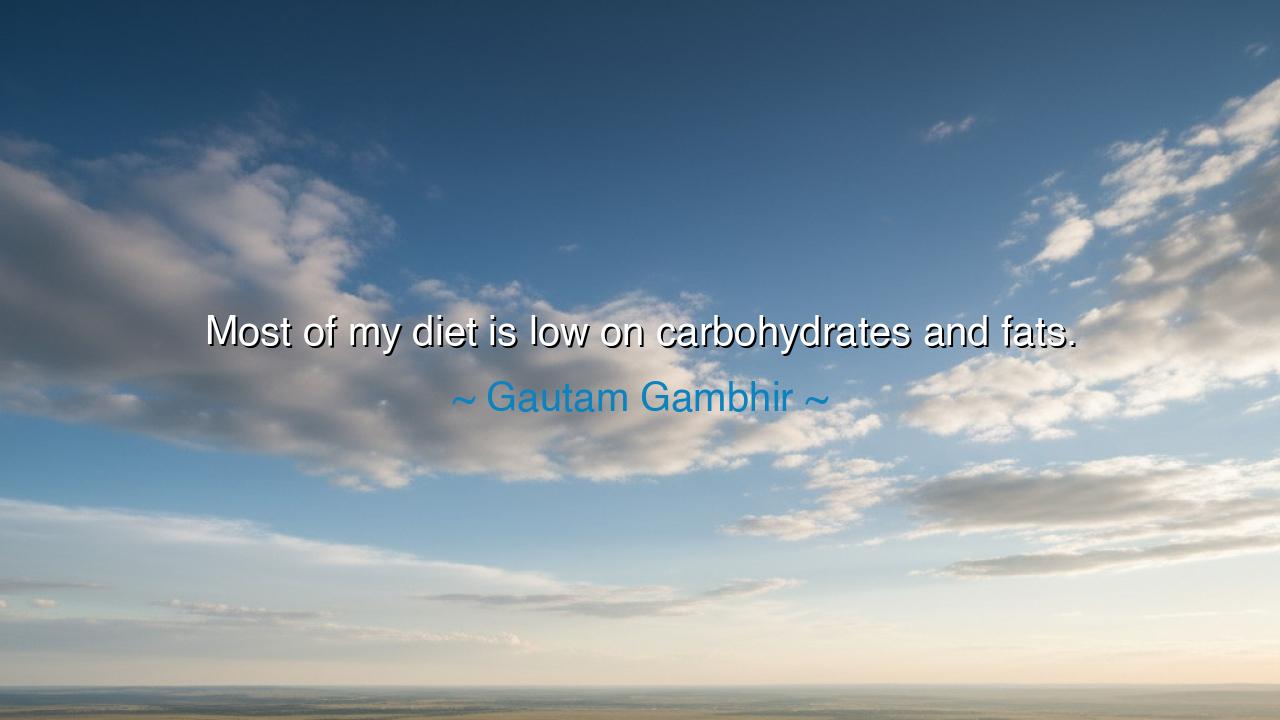
Most of my diet is low on carbohydrates and fats.






In the words of Gautam Gambhir, “Most of my diet is low on carbohydrates and fats,” there is a message that speaks beyond the realm of nutrition—it is a song of discipline, a hymn to self-mastery, and a reminder of the eternal bond between the body and the will. In his words, we hear not the language of vanity, but of purpose—the voice of one who understands that greatness is not achieved by talent alone, but by the steady governance of desire. The path of the warrior, the athlete, the seeker—it is the same path: restraint in the face of abundance, clarity in the midst of temptation.
To live “low on carbohydrates and fats” is to choose lightness over lethargy, awareness over indulgence. It is to walk the narrow bridge between hunger and satisfaction, guided by wisdom, not impulse. The ancients called this temperance, one of the highest virtues of the soul. For they knew that excess dulls the spirit as surely as it burdens the flesh. The man who can govern his appetite can also govern his destiny. Thus, Gambhir’s words are not merely about food, but about focus, about the art of living in alignment with one’s purpose.
In the ancient cities of Greece, before the dawn of the Olympic Games, the athletes trained not only their bodies, but their habits. They ate sparingly, slept early, and sought harmony between exertion and rest. Their meals were measured, their desires restrained. To be victorious in the arena, they first had to be victorious over themselves. The same spirit breathes through Gambhir’s discipline—for he, too, has walked the long road where success demands sacrifice. The cricketer’s endurance, the soldier’s vigilance, the monk’s serenity—all spring from the same soil of self-control.
The philosopher Epictetus once taught, “No man is free who is not master of himself.” Freedom is not indulgence—it is independence from desire. Gambhir’s restraint is the practice of this freedom. To eat sparingly, to live with awareness, is to declare dominion over one’s impulses. Such mastery cannot be taught in books nor purchased in luxury—it must be forged daily, in the quiet crucible of habit. Each meal, each choice, becomes a silent victory.
Consider also the story of Ashoka the Great, the warrior king who conquered kingdoms but later turned inward to conquer himself. After the battle of Kalinga, his heart, once filled with hunger for conquest, turned toward peace and balance. He simplified his life, reduced his indulgences, and became a beacon of self-restraint and wisdom. His strength did not diminish—it transformed. So too does Gambhir’s discipline mirror this truth: that true power is not in the taking, but in the choosing—not in excess, but in the harmony of control.
To live with low carbohydrates and fats, then, is to live with purpose—to honor the body as a sacred vessel, not as a playground of craving. It is to remember that health is not built in bursts of effort, but in the quiet repetition of wise choices. The ancients would have called such living areté—the excellence of one’s nature expressed through conscious action. Each act of restraint becomes a step toward greatness, each day of balance a stone in the foundation of longevity and clarity.
Let this be the lesson for all who seek strength of body and spirit: master your habits, and they shall no longer master you. Eat not for pleasure alone, but for purpose. Let nourishment serve vitality, not vanity. Remember that what you deny yourself today returns as strength tomorrow. The one who governs his plate can also govern his mind, and in doing so, he walks the path of the wise.
Thus, the teaching of Gautam Gambhir endures like a timeless mantra: discipline is freedom, and restraint is strength. To live lightly is to live freely. The body that is unburdened moves with grace; the mind that is uncluttered sees with clarity. Walk, then, in balance—feed the flame of life, but never let it consume you. For in moderation lies mastery, and in mastery, the quiet glory of peace and power combined.






AAdministratorAdministrator
Welcome, honored guests. Please leave a comment, we will respond soon